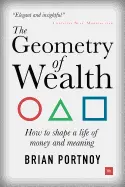
The Geometry of Wealth - by Brian Portnoy
ISBN: 0857196715Date read: 2018-09-10
How strongly I recommend it: 2/10
(See my list of 430+ books, for more.)
Go to the Amazon page for details and reviews.
I was expecting something more philosophical. Instead mostly just got advice to protect the downside.
my notes
Three important steps:
Define purpose: Illuminate the ingredients for a life well-lived
Set priorities: Chart a focused strategy to do the right things in the right order
Make decisions: Employ simplified tactics to drive better outcomes
Wealth is funded contentment - the ability to underwrite a meaningful life.
Priority #1 is risk management. It is to protect ourselves from the potential for loss, especially catastrophe.
The proper mindset values avoiding mistakes over demonstrating brilliance.
Nothing is so bitter that a calm mind cannot find comfort in it.
The more information we gather, the worse choices we make.
The more information we gather, the more compelled we feel to make decisions.
We don’t like to harvest new information but then do nothing with it. It feels like wasted effort.
Deliberation hinders satisfaction. At a certain point, putting too much thought into something undermines the value.
Comparison shopping is mentally exhausting.
Experiences are more immune to hedonic adaptation. They are harder to get used to, unlike material goods.
Smaller, frequent experiences better defy the hedonic treadmill.
Pay a small cost to avoid a potential catastrophe. And if the small cost led to large gains, even better.
Survive. In the wild, rule one is stay alive. After that, it’s all upside.
To achieve great things in life, to come out ahead, to make great investment returns, you need to put your capital at risk (human, financial, social, or otherwise).
That could be paying for a pricey education, investing in the stock market, or asking the prettiest girl to the prom.
But taking more risk does not produce greater returns. Instead, taking more risk increases the variability of future outcomes.
If there were a reliable relationship between more risk and bigger rewards, then technically you wouldn’t be taking more risk. Everyone would bet long shots all the time.
We want to be more right than others - to leverage our edge.
Choosing the right pre-school, anticipating the next storm.
At least at the start, we don’t want to be more right, we want to be less wrong. This is winning by not losing.
The aim should be to control risk: “risk control” not “risk avoidance”.
Great investors naturally think about being less wrong.
They patiently wait until the odds are so stacked in their favor it would be foolish not to bet.
Focus on minimizing the damage.
Win not by making valid predictions but by allowing yourself to correct false ones.
People may believe that who they are today is pretty much who they will be tomorrow, despite the fact that it isn’t who they were yesterday.
Take the time to think differently about common problems.
Always invert.
Immunize your liabilities before you maximize your assets.
To achieve satisfactory investment results is easier than most realize.
To achieve superior results is harder than it looks.